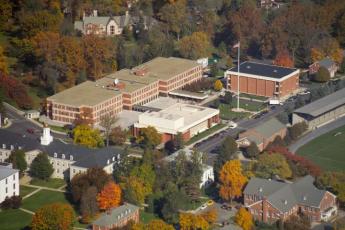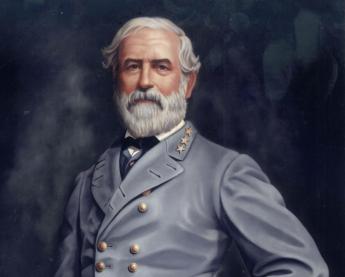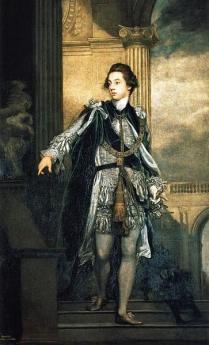Related Topics
Volunteerism
The characteristic American behavior called volunteerism got its start with Benjamin Franklin's Junto, and has been a source of comment by foreign visitors ever since. It's still a very active force.
Tourist Trips Around Philadelphia and the Quaker Colonies
The states of Pennsylvania, Delaware, and southern New Jersey all belonged to William Penn the Quaker. He was the largest private landholder in American history. Using explicit directions, comprehensive touring of the Quaker Colonies takes seven full days. Local residents would need a couple dozen one-day trips to get up to speed.
Right Angle Club: 2013
Reflections about the 91st year of the Club's existence. Delivered for the annual President's dinner at The Philadelphia Club, January 17, 2014.
George Ross Fisher, scribe.
Right Angle Club, 2018
New topic 2018-02-03 03:54:38 description
Army War College in Carlisle

|
| U.S. Army War College |
Our program chairman, Carter Broach, once attended the Army War College, so he was in a position to invite Colonel Tom O'Steen to the Right Angle Club to tell us what the College was all about. Although there may have been times in the past when the Army welcomed secrecy surrounding its College, in recent years it has become concerned that the military may be isolating itself too much from the people it serves and defends. So Col. O'Steen was told he was welcome to talk to us. In fact, giving one speech to the public is a requirement for graduation. The history goes back to 1757, includes Ben Franklin, and also includes some interesting anecdotes which might not have been expected of a War College.
Like all land in Pennsylvania, this plot within what is now the town of Carlisle, PA, once belonged to William Penn. Nobody else owned it until 1757 when Ben Franklin was sent to negotiate its transfer from the Indians. William Penn had been careful to buy land from the Indians, even though he also formally owned it as part of a deed from Charles II of England. Other land proprietors had not been so scrupulous, often complaining of the Indian massacres which resulted, although seldom adopting Penn's rather inexpensive method of avoidance.

|
| Robert E. Lee |
During the Revolutionary War, Carlisle was a comfortable distance from the British Navy, and served as a backwoods artillery arsenal along the Appalachian Mountains, much as the Ho Chi Minh Trail served our enemy in the Vietnam conflict, along with an Asian mountain range. From 1790 to 1860, Carlisle served as a cavalry post, and then General Robert E. Lee invaded Pennsylvania up one side of a mountain ridge, with General Meade bringing up the Union forces from Washington DC on the other side of the ridge. The two valleys come together at Carlisle, so that spot had long been recognized as commanding both. Lee only got as far as Gettysburg before Meade caught up with him, but General Ewell's Corps took Carlisle as an advance guard. Confederate cavalry General JEB Stuart took Carlisle without sustaining a fight. Meanwhile, General Lee was fretting that Stuart was supposed to be his eyes and ears, keeping him informed of Union opposition, and it is possible that Stuart's Carlisle diversion thus had some influence on the outcome of the Battle of Gettysburg.

|
| Earl of Carlisle |
By 1879 there remained little purpose in a Carlisle military post, so it was turned into an Indian Industrial School, a couple of miles East of Dickinson College. After the Civil War, the nation lost its taste for exterminating Indians and turned to the idea of removing Indian boys from their families in order to assimilate them to white customs. Unfortunately, this did not work very well, and in fact, nothing worked very well. There are over 340 Indian languages from Eskimo to Aztec, but there is no record of any tribe allowing itself to be assimilated. The Spanish tried slavery, the French tried intermarriage, and the Americans tried persuasion and reasonableness. Eventually, we gave up and isolated them on reservations, but not before a wide-spread attempt was made to isolate Indian boys in boarding schools, hoping to remove them from tribal influences. That didn't work, either, but it was being attempted at Carlisle in the late 19th century. Interestingly, Carlisle is named after the family of the Earl of Carlisle, who was sent by Lord North after the disastrous British defeat at Saratoga, in order to see if the colonists might still be interested in Taxation with Representation. We weren't, so the Revolutionary War dragged on for another six years. Somehow, when war fever captures countries, small victories seems to close minds to what they had been originally fighting over. If the War College has time for another lesson, I suggest they add that one to their curriculum.
Before going back to the origins of the Army War College, we should salute the momentous football game of 1912, between the West Point cadets who included Dwight Eisenhower, and the Carlisle Indian School team which included Jim Thorpe. Thorpe was a member of an Oklahoma Indian tribe, but in many ways has been regarded as the best all-around American athlete in history. Eisenhower was pretty good, too, but Carlisle won the game.
 To raise and support Armies, but no Appropriation of Money to that Use shall be for a longer Term than two Years; To provide and maintain a Navy; 
|
| Constitution, Article 1, section 8 |
Several members of the Right Angle audience expressed the view that the Armed Services have more to fear from know-it-all university professors who feel they monopolize the field of strategic thinking than from Congress, which tends to have a goodly number of combat veterans in its ranks. It's all very well to repeat the mantra that the armed forces must respect civilian control, and then it's also just as well to remember that most coups are military coups in other countries. But whatever the future brings, these young Lt. Colonels will be the ones we must count on when the going gets really tough.
Originally published: Friday, March 15, 2013; most-recently modified: Monday, May 20, 2019